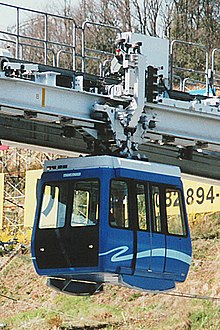Skyrail Midorizaka Line
| Skyrail Midorizaka Line | ||||||||||||||||||||||||||||||||||||||||||||||||
|---|---|---|---|---|---|---|---|---|---|---|---|---|---|---|---|---|---|---|---|---|---|---|---|---|---|---|---|---|---|---|---|---|---|---|---|---|---|---|---|---|---|---|---|---|---|---|---|---|
 | ||||||||||||||||||||||||||||||||||||||||||||||||
| Overview | ||||||||||||||||||||||||||||||||||||||||||||||||
| Other name(s) | Hiroshima Short Distance Transit Seno Line | |||||||||||||||||||||||||||||||||||||||||||||||
| Native name | スカイレールみどり坂線 (広島短距離交通瀬野線) | |||||||||||||||||||||||||||||||||||||||||||||||
| Stations | 3 | |||||||||||||||||||||||||||||||||||||||||||||||
| Service | ||||||||||||||||||||||||||||||||||||||||||||||||
| Type | Suspended monorail | |||||||||||||||||||||||||||||||||||||||||||||||
| Operator(s) | Skyrail Service (スカイレールサービス) | |||||||||||||||||||||||||||||||||||||||||||||||
| Rolling stock | 200 series | |||||||||||||||||||||||||||||||||||||||||||||||
| History | ||||||||||||||||||||||||||||||||||||||||||||||||
| Opened | 28 August 1998 | |||||||||||||||||||||||||||||||||||||||||||||||
| Closed | April 30, 2024 | |||||||||||||||||||||||||||||||||||||||||||||||
| Technical | ||||||||||||||||||||||||||||||||||||||||||||||||
| Line length | 1.3 km (0.81 mi) | |||||||||||||||||||||||||||||||||||||||||||||||
| Number of tracks | 2 | |||||||||||||||||||||||||||||||||||||||||||||||
| Character | Elevated | |||||||||||||||||||||||||||||||||||||||||||||||
| Electrification | 440 V DC | |||||||||||||||||||||||||||||||||||||||||||||||
| Signalling | Linear motor | |||||||||||||||||||||||||||||||||||||||||||||||
| Highest elevation | 180 m (590 ft) | |||||||||||||||||||||||||||||||||||||||||||||||
| ||||||||||||||||||||||||||||||||||||||||||||||||

The Skyrail Midorizaka Line (スカイレールみどり坂線, Sukairēru Midorizaka-sen) was a monorail/people mover line operated by Skyrail Service. The line ran between Midoriguchi and Midori-Chūō, all within the new town called Skyrail Town Midorizaka, located in Aki, Hiroshima, Hiroshima Prefecture, Japan. The line was officially called the Hiroshima Short Distance Transit Seno Line (広島短距離交通瀬野線, Hiroshima Tankyori Kōtsū Seno-sen).
The line was the first Japanese public transport system to introduce a smart card, simply called IC Commuter Pass (IC定期券, Ai Shī Teikiken) and branded with the words "SKYRAIL PASS", which launched along with the line's opening in 1998.[1]
History
[edit]The line opened on 28 August 1998, with a total construction cost of approximately ¥6.2 billion.[2]
Skyrail Service announced on 5 November 2022 that the line would be closed by the end of 2023 due to profitability concerns, and that electric buses operated by Geiyo Bus would operate as a replacement, with a route providing greater coverage across the community.[3][4] The closure was later postponed to spring 2024.[5]
Skyrail ended operations at noon on April 30, 2024, and the company dissolved the following day.[4]
Technology
[edit]The line used a unique "Skyrail" rail transport system developed mainly by Kobe Steel and Mitsubishi Heavy Industries. It was a fusion between a suspended monorail and an aerial lift (ropeway). Driverless gondola-sized cars, suspended from a single steel track, were moved by an attached cable. Inside each station, cars released the cable and were moved by linear motors. The technology allowed the line to climb steep slopes of up to 14 degrees, while also being able to accommodate curves with a radius of up to 30 meters.[6]
Rolling stock
[edit]The entire line used 200 series vehicles, which held up to 25 people. The operating speed was 15 km/h.[6]
Services
[edit]The line operated from around 6:30 a.m. to 10 p.m. daily, with cars that ran every 15 minutes during midday and late night, and every 5–10 minutes at peak morning and evening times. A night taxi provided services between 10 p.m. and midnight.[7]
A one-way trip across the entire length of the line took five minutes. The fare was ¥170 for adults and could be paid with a QR code-scannable ticket (issued from a ticket machine) or Skyrail-specific smart card.[6]
Stations
[edit]All the stations on the line are elevated, with two side platforms serving two tracks.
| Name | Japanese | Coordinates | Distance (km) | Transfers | |
|---|---|---|---|---|---|
| Between stations |
Total | ||||
| Midoriguchi | みどり口 | 34°25′19.9″N 132°35′46.8″E / 34.422194°N 132.596333°E | - | 0 | G Sanyo Main Line (Seno Station) |
| Midori-Nakamachi | みどり中街 | 34°25′40″N 132°35′42″E / 34.42778°N 132.59500°E | 0.7 | 0.7 | |
| Midori-Chūō | みどり中央 | 34°25′49″N 132°35′22″E / 34.43028°N 132.58944°E | 0.6 | 1.3 | |
-
Midoriguchi station
-
Midori-Nakamachi station
-
Midori-Chūō station
See also
[edit]References
[edit]- ^ "進化する自動改札機、世界初の遅延証明も!". Toyo Keizai (in Japanese). 2015-01-02. Retrieved 2022-11-07.
- ^ "新交通システム「スカイレール」運行開始". Ministry of Land, Infrastructure, Transport and Tourism. Retrieved 2022-11-07.
- ^ "みどり坂のスカイレール、2023年末めどに運行終了へ JR瀬野駅と団地結ぶ交通システム【動画】". Chugoku Shimbun (in Japanese). 5 November 2022. Retrieved 2022-11-07.
- ^ a b "世界唯一の公共交通「スカイレール」2024年5月1日廃止決定! 運行終了は異例の真っ昼間". 乗りものニュース (in Japanese). 2024-03-02. Retrieved 2024-03-05.
- ^ "スカイレール 運行終了を来年4月末に延期 広島". 14 June 2023. Retrieved 2023-08-23.
- ^ a b c "日本唯一の交通システム「スカイレール」 見かけはロープウェイ、走行にリニアの技術". Traffic News (in Japanese). 11 September 2018. Retrieved 2022-11-07.
- ^ "スカイレール・ジャンボタクシー". Sekisui House. 2016-11-10. Archived from the original on 2016-11-10. Retrieved 2022-11-07.
External links
[edit]- Intra-city transport system: Skyrail, via Kobe Steel's official website (in Japanese)
- Video on YouTube



